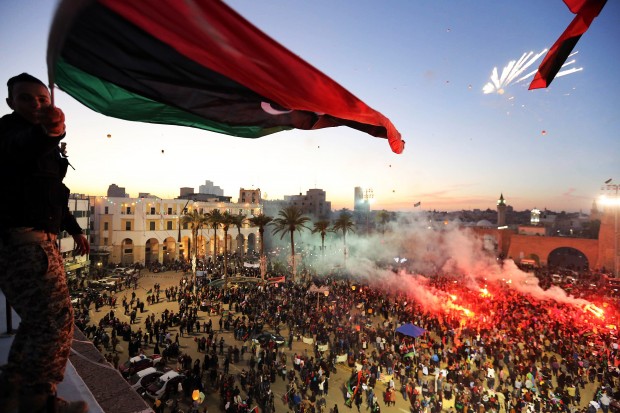You would be wrong if you were to say that Libya’s existing state institutions were capable of halting its slide into chaos and division.
Libyans have inherited a daunting legacy from Colonel Muammar Gaddafi, the most prominent aspect of which is the absence of any institutional structure within the Libyan state. This has cast a shadow over the post-Gaddafi regime, for the country lacks strong institutions that could potentially help it forge ahead or use as building blocks for developing other institutions. The future will be marked by fragmentation and division if the situation continues to deteriorate.
Authorities such as the General National Congress (GNC) and transitional government are ineffective thanks to several factors. First, the birth of these institutions was flawed from the beginning. They inherited unresolved issues that were postponed by the National Transitional Council as a means to avoid bearing responsibility in the presence of the Libyan people. This is the reality today, alongside the political isolation law that was approved at gunpoint and that completely muddled the Libyan political arena. This is one of the main reasons behind the political crisis the country currently faces.
The second of these factors is the Constitutional Declaration issued in August 2011, which charged the GNC, an elected representative institution, with completing two main tasks: first, to form an interim government to manage the transitional phase, and, second, to form a constituent assembly to draft a permanent constitution for the country. The GNC succeeded in the first task, albeit with difficulty, and we do not yet know the fate of the second thanks to political conflicts.
The third factor is the election law on which the selection of members of the GNC was based. It stipulates that one-third of the seats in the GNC will be allocated to political entities and two-thirds to independents. The law has caused much confusion and controversy, and eventually resulted in the formation of an incoherent parliament, a fact clearly demonstrated by the GNC’s work and the ways in which political conflicts prevented any progress from being made.
The fourth factor is that major problems exist in Libya, and official institutions are unable to confront them. This gave way to tribal intervention, which bypasses the government and forges independent political settlements. It is as though the official powers fear becoming close with tribes to maintain friendly relations, or are afraid that accusations will fly that they favor one party over another. Then there is the issue of port closures, which began last July thanks to the former guard commander of the oil installations, Ibrahim Al-Jadran. The closures incapacitated the government as well as the GNC. A compromise with the protestors located in these ports has yet to be reached because of disputes over the distribution of oil revenue and mutual accusations of corruption. An acute lack of security institutions has become a reality thanks to many factors such as inflation, the vast numbers of armed “revolutionaries” still active, and the authorities’ failure to appreciate their role in the overthrow of Gaddafi from the revolutionaries’ point of view. Additional factors include a lack of any clear vision or plan by the GNC or the interim government for dealing with security issues, or incorporating former revolutionaries into state institutions. A number of tribal conflicts in the country’s west and south have emerged due in part to the unprecedented proliferation of weapons among citizens, as well as the high rate of assassinations and kidnappings throughout the country. Assassinations abound in the east, while kidnappings are on the rise in the west. Both thrive in the south.
It appears that the dominance of specific armed groups—secured through their role in overthrowing Gaddafi—eventually granted them more power and legitimacy than the state itself. They further solidified their preeminence after the regime’s ouster through the stockpiling of arms and salary increases. This has enabled armed groups to challenge the state in all disputes.
For these reasons and others, the state structures that now exist are unable to deal effectively with any of the sensitive issues that emerged during the war on the Gaddafi regime and its aftermath, most notably issues regarding displaced persons and immigrants, as well as Gaddafi-era detainees and compensation demanded by rebels. These issues, in addition to emerging tribal conflicts that threaten the nation’s unity, have exhausted institutions that have not yet even laid their foundations.
The counterpoint to this article can be read here.
